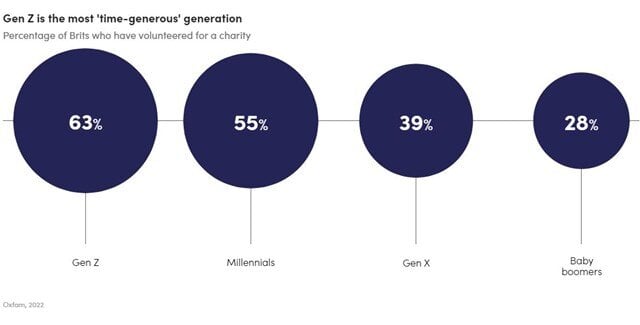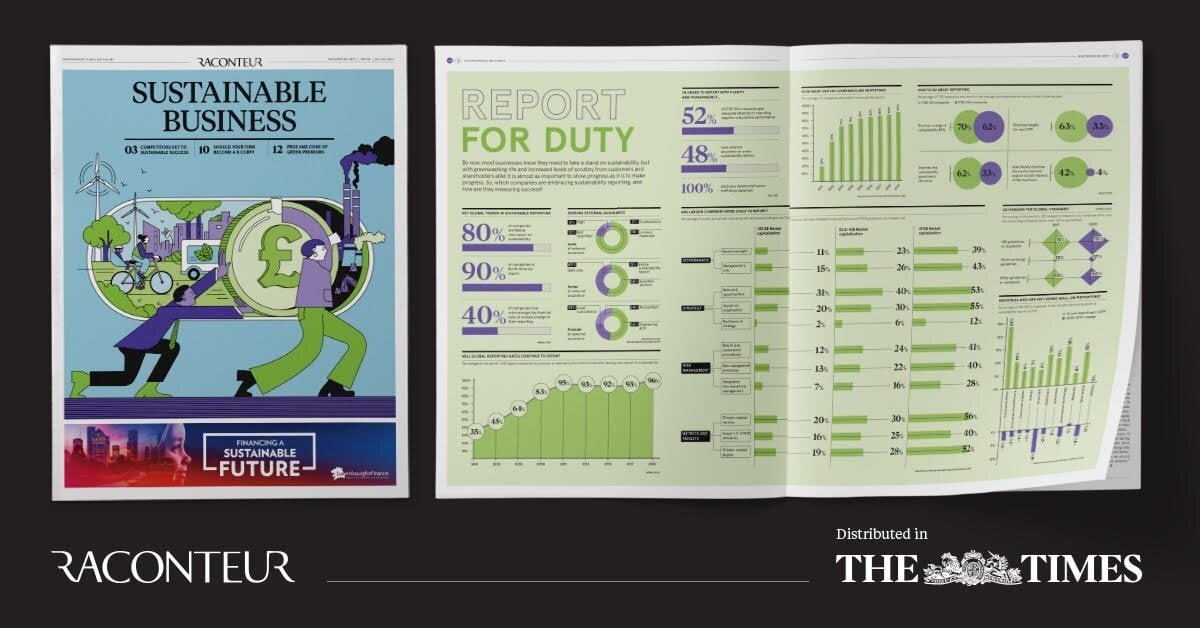Generation Z is entering the workforce with a different mindset from its predecessors. Not only have today’s graduates been raised in a digital world, making them far more tech-savvy than earlier cohorts, but their lives have also been shaped by constant disruption.
From government-imposed austerity programmes that have decimated community services to a global pandemic that was immediately followed by a fresh cost-of-living crisis, gen Z is entering the workforce with a stronger sense of social duty than many of their older peers. And with that, employers are being asked to raise their social responsibility game.
“Gen Z is far more connected and much more resilient because of the experiences they’ve had in early life that have changed how people feel about their communities,” says Zoe Colosimo, chief operating officer at Neighbourly, a platform that connects businesses with small charities and community causes. “They have ingrained values around diversity and inclusion, and are very aware of climate breakdown, human rights and social inequalities because they’re so connected through their digital networks.”
The more you contribute, the more trust is generated, and many studies show that high-trust societies have much better economic outcomes
Giving locally builds trust
As a result, these values now feed into how young people vet potential employers. Companies need to have a clearly defined purpose to connect with this generation, according to Colosimo. While businesses know that consumers and employees are more inclined to support brands that display strong environmental, social and governance performance, scepticism around corporate altruism is rife. Often, the key for organisations to establish a purpose that people can get behind is to start by looking at how they can help the communities in which they operate.
An annual study by Neighbourly and YouGov shows that by investing in local communities and prioritising local charitable giving over national or international causes, companies can generate greater trust. About two-thirds of adults in the UK consistently say they are more trusting of a company which contributes to the community where they live and work.
“There is significant evidence that points to the fact that people prefer to shop with, spend money with, and favour brands that can prove they are purposeful and are contributing,” says Colosimo. “Our research shows that the extent to which businesses contribute locally is index-linked to how much we trust that business.”
For example, 63% of respondents in the most recent Neighbourly survey said they were more likely to trust a company that gave to a smaller local charity compared to 47% for a national charity. That figure drops to 31% for an international cause.
There’s evidence to suggest that engaging with local charities also boosts employee wellbeing. Colosimo explains: “It helps employees feel connected to their community because they’re able to nominate and volunteer for charities that are meaningful to them, and they can see they are making an impact.”
Make conscious contributions that genuinely help
There are also potential negative consequences for businesses that don’t take their social obligations seriously.
“Companies that aren’t able to show that they are acting in a purposeful way risk not being able to attract younger talent who want to work for businesses that can prove they’re doing the right thing,” says Colosimo. “It will also have an impact on talent retention. Companies have to make sure the business is a place where people feel proud to work.”
While it doesn’t matter if companies are giving support through donations or volunteering, what is important is that companies listen to their communities and are genuine in their motives.

“What is essential is that it’s needs-led. This isn't about throwing stuff into the community; this is saying to the community, ‘What do you need?’ and making sure that your contribution is driven by what is being asked for,” says Colosimo. “It is also about the employee having a voice and being able to nominate causes that they care about as opposed to the old top-down corporate CSR tick-box approach.”
‘Businesses cannot survive in societies that fail’
As focus on ESG changes perceptions about the importance of creating socially sustainable businesses, even among shareholders and investors, and as gen Z advance in their careers as the corporate leaders of tomorrow, how companies think about profits in the future may look very different from today.
“It will be about community for profit,” Colosimo continues. “Companies will see the economic benefit of building trust, and the way to build it is to collaborate in a way that gives back so that the community can be self-sustaining. The more you contribute, the more trust is generated, and many studies show that high-trust societies have much better economic outcomes.”
For companies that are just starting on this journey, Colosimo says it is important to recognise that not all charitable giving is equal.
“We’re not saying you should switch off your national charitable programmes. We’re saying businesses should think consciously about how they’re contributing. If you’re able to help build sustainable communities, your business can have a material benefit on the society that it operates in,” she says. “As former Unilever CEO Paul Polman said, ‘Businesses cannot survive in societies that fail.’ So if businesses can give back in a way that is meaningful and that helps sustain those communities, then it’s good for business.”
An excerpt from: Responsible business 2.0: Foundations for the Future







.png)
.jpg)

